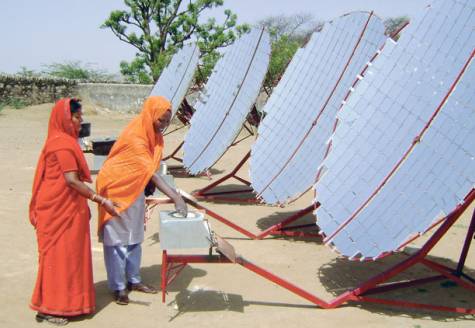Barefoot solar engineers (BSEs)

About Barefoot College
Barefoot College was established in 1972. Located in Rajastan, India it is a non-governmental organisation which engages in sustainable and self-sufficient services and solutions for rural communities. Their ‘Barefoot solutions’ are classified into solar energy, water, education, health care, rural handicrafts, people’s action, communication, women’s empowerment and wasteland development.http://www.barefootcollege.org/. Viewed on December 13, 2010.
Selection Process
In order for a village to be considered by Barefoot College for solar electrification, it needs to fulfil three categories: be inaccessible, remote and non-electrified. At an initial meeting with members of such a community, Barefoot College representatives explain the benefits of solar energy. If the community is interested, a Village Environment Energy Committee (VEEC) is established. The VEEC, consisting of men and women, inquire within the village to find out which households are interested. A monthly contribution is necessary from every household in order to create a feeling of ownership, which will ensure respect for the solar equipment.
The entire village community then selects a BSE through transparent means. This is a requirement so that all members of the community know who has been selected. Barefoot College encourages villagers to select someone who does not qualify for low government positions, which often neglect middle-aged women, widows and single mothers. Since there is an incentive to migrate to larger cities once training has been obtained, choosing these women will increase the chances of return to the village. Finally, there needs to be a general consensus within the community to allow the newly selected BSE to travel to India for 6 months and fulfil the training.

Barefoot Solar Engineers (BSEs)
The role of a Barefoot Solar Engineer (BSE) is to establish solar electricity for her village through solar lighting units and then maintain and repair the equipment for a minimum of five years. A BSE must also establish a Rural Electronic workshop within her community to enable other villagers to acquire knowledge regarding the new material. The BSE’s role is essential in the maintaining of light which is environmentally friendly, economically advantageous and healthy (since solar panels provide an alternative to toxins released by paraffin lamps).
Skills acquired
A BSE is trained to be able to “understand and identify basic electrical terms, components and equipment. They learn to assemble and fabricate circuits and solar lanterns, solar lamps, charge controllers, choke coils and transformers, and learn to correctly connect modules, batteries, lamps and charge controllers. Barefoot College strives to make every trainee capable enough to confidently and independently install, test, repair and maintain fixed solar lighting units, solar lanterns, as well as a REW (Rural Electronic workshop).”http://www.barefootcollege.org/sol_approach.asp. Viewed on December 12, 2010.
Impact on Women
By becoming an BSE, women who previously were unable to acquire a job at even the lowest levels of their government, are able to secure an income whilst becoming an invaluable source to their community. Furthermore, their role in establishing a Rural Electronic workshop establishes them as teachers, promoting environmental values and their own values within their community.
References
See also
India Women and the EnvironmentExternal links
Kenyan Women Light Up Villages with Solar Power
Progress powered by local knowledge
Proposal for A Solar Energy Project For Akwasiho Village
UN Interactive Expert Panel, Barefoot Solar Engineers A Community Solution


